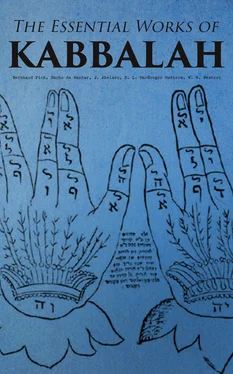Then Rabbi Eleazar read aloud: "Who is this that cometh out of the wilderness?" (Cant. III., 6). The two words "who" and "this" refer to two holy beings intimately associated and joined together by a tie which is termed olah (sacrifice). Though the literal meaning of this word is to ascend or come up, yet it occultly refers to the "Holy of Holies." Again "who" (Mi) is united to "this" (Zoth) in order that it, the Holy of Holies, may come from the wilderness. "Out of the wilderness" means mystically from or out of the word, and we are taught: "Thy word is comely" (Cant. IV., 3). Also by way of tradition has been imparted to us the signification of the words: "Who shall deliver us out of the hand of this mighty God?" This is the God that smote the Egyptians with all the plagues in the wilderness" (I. Sam., iv., 8). Why in the wilderness, when we read it was in their own land of Egypt? Now the term bemidhar (in the wilderness) in its real meaning is "by the Word," and everything that was done unto them was done by the Word of the Lord. And this is true generally.
When man rises in the morning he should utter or pronounce a blessing as soon as he opens his eyes, as did the holy men of olden time. They used to place near themselves a vessel of water. When waking they washed their hands and then commenced the study of the secret doctrine. At the time of cock crow, whether it be at midnight or break of day, the Holy One is found in the Garden of Eden, during which the defiled and impure are forbidden to pray or bless. When a man sleeps and his soul quits his body, an impure spirit comes and attaches itself to it and pollutes it. This is why it is forbidden to bless God before first washing the hands and engaging in the study of occult science. This applies also during the day when a man is awake; for then the impure spirit is unable to defile him except he is in some improper place. Even then it is unlawful when leaving it to bless God or recite a single verse of scripture without first washing his hands, though he may not have touched any impure thing. Woe to those who neglect and regard not this rite! They know nothing of the glory of their Lord; nothing of the law or principle upon which the world is founded. In every impure place there is an impure spirit whose delight is to dwell there and attach itself to man.
Then spake Rabbi Simeon and said: Whoever gives not to God a part of his works or substance is guilty of avarice. Satan hates him, becomes his accuser and takes him out of the world. Great and terrible are the afflictions he has to endure! We give to God when we give to the poor as far as we are able, in the time of their need and necessity. If in times of our rejoicing and feasting the Holy One observes them ignored and forgotten and uncared for he grieves over and sympathizes with them and ascends on high, thinking to destroy the world. Then the souls of just men made righteous gather before him, saying: "Lord of the universe! thy name is called gracious and merciful. Have pity upon thy erring, forgetful children." And the Holy One replies: "Is it not upon mercy that I have founded the world as it is written: "The world is builded up on mercy" (Ps. lxxxix., 2). Then spake the angels: "Ruler of the universe! behold such a man eats and drinks and is able to succor the poor, yet refrains his hand." Then goeth forth the accuser, after obtaining permission, and hurries him out of existence. Who in the world was so great as Abraham, who did good and was kind to all creatures? Yet we learn from tradition that when Isaac, his son, was weaned, (Gen. 21:8) he made a great feast and invited thereto all the great men of the place to be present. At the festive gathering it is said that an accusing angel was there in the form of a poor unknown beggar, but no one recognized or took any notice of him. Abraham busied himself in attending to and waiting upon his royal and noble guests, whilst Sarah suckled the infants of all those who did not believe that she had given birth to a child and said that Isaac was some foundling who had been picked up on the roadside and brought to Sarah. When, therefore, they brought their own infants Sarah suckled all of them in their presence as the scripture states: "Who would have said unto Abraham that Sarah should have given children suck." (Gen 21:7) The accusing angel happened to be entering the house when Sarah was uttering the words: "God has made me a subject of laughter." Forthwith he presented himself before the Holy One and said: "Lord of the universe, Thou callest Abraham thy friend. He has made a great feast, but has not remembered the poor and has not even offered a sacrifice of a single turtle dove. Sarah also says Thou hast caused her to become a subject of derisive laughter and jeers." (Gen. 21:6) Then replied the Holy One: "Who is there amongst men, kinder and more charitable than Abraham?" The accuser, however, was dissatisfied until he learned that the feast would be followed by sorrow and trouble to Abraham, which came to pass when God commanded Abraham to offer up Isaac as a sacrifice, and Sarah died through anguish of heart when she learned what God had commanded with respect to her son. All these misfortunes arose through neglect of the poor."
On another occasion Rabbi Simeon spake and said: it is written: "And Hezekiah turned his face toward the wall and prayed unto the Lord" (Is. xxxviii., 2). Observe how great the power and influence of a student of the secret doctrine. He is superior to all others, for he fears nothing, being in close touch with the tree of life, from which he receives counsel and instruction all his days. It teaches is in the way of truth and how to avoid evil that may assail us, and also how to direct our ways and walk before the Lord. Therefore, it is necessary we should study the secret doctrine day and night and observe its teachings and doctrines. By night, when reclining on our beds we ought to submit ourselves to the kingdom of heaven and make it our chief object to commend ourselves to the care and guardianship of the Almighty. Then become we freed from all evil influences and demoniacal powers have no sway over us. In the morning the student of esoteric science rises and gives thanks to his Lord and wends his way to the temple and there pours forth his soul in prayer and adoration. Afterwards he should take counsel from the holy patriarchs, as it is written: "I will come into thy house in the multitude of thy mercies, and in thy fear will I worship toward thy holy temple" (Ps. v. 7). We are taught from tradition never to enter the house of prayer before being instructed by the patriarchs, Abraham, Isaac and Jacob, who will inspire us with suitable prayers to be addressed to the Holy One, for the words: "In the multitude of thy mercy" designate Abraham; "I will worship in or toward thy holy temple," refer to Isaac; and "in thy fear," to Jacob. Then we render acceptable worship and of us it will he said: "Israel, thou art my servant in whom I will be glorified" (Is. xlix., 3).
Rabbi Pinchus used frequently to go and visit Rabbi Rechumi, whose dwelling was on the borders of the Sea of Genessareth. Rabbi Rechumi was very aged and had become blind. He spake and said to Rabbi Pinchus: I have heard that the son of Jochai, my fellow student in esoteric science, possesses a most precious stone, a pearl I have greatly desired to behold. It radiates rays of light like those of the sun and lightens up the world and will continue to do so until the Ancient of Days sits upon his throne. Thou art his grandson, therefore happy is thy lot. Go thou my son and search for this glittering and lustrous pearl, for now is the most propitious time for finding it.
Rabbi Pinchus with two others, went forth and embarked on a vessel. Observing two birds flying overhead, he cried aloud: Birds! birds! flying over the waters, have you seen the dwelling place of the son of Jochai? After a few moments again he cried: Birds! Birds! come and tell me. Then flew they away, but after a time returned and in the beak of one of them was a slip of paper on which was written: "The son of Jochai has quitted and left the cave in which he dwells with Rabbi Eleazar his son." Then he went and found Rabbi Simeon suffering from bodily sores. To his expressions of sorrow, finding him so ill and afflicted, Rabbi Simeon replied: I am glad, Rabbi Pinchus, thou hast found me thus. If it had been otherwise I should not be what I am. Suffering makes us wiser and better.
Читать дальше












